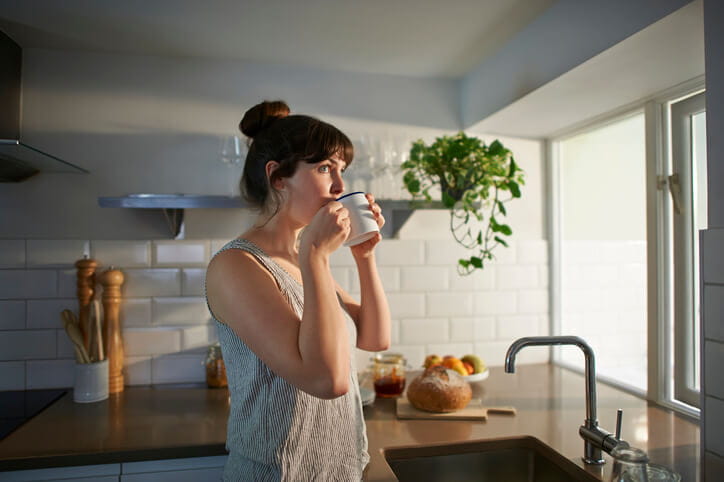Baptist Health Virtual Care
Here When You Need Us the Most
Find Which Virtual Care Visit is Right For You
Caffeine is a stimulant, which can have negative effects if you have anxiety. The jittery feeling you get in your body after having caffeine is similar to a frightening experience. Caffeine stimulates your “fight or flight” response, and studies show this can make your anxiety worse and even trigger an anxiety attack. Just like the symptoms of anxiety, if you have too much coffee or another source of caffeine, you can feel nervous, moody, and have trouble falling asleep.
According to Harvard Medical School, caffeine use can cause the same symptoms as anxiety. The caffeine-induced symptoms that are similar to anxiety include:
• Nervousness
• Restlessness
• Trouble sleeping
• Fast heart rate
• Gastrointestinal symptoms
According to the Food and Drug Administration (FDA), 400 mg of caffeine, or about four cups of coffee, typically doesn’t result in negative or dangerous effects for healthy adults. The FDA also estimates that 1,200 mg of caffeine can cause toxic effects, including seizures.
It’s important to note that there are wide variations in how quickly different people metabolize caffeine and how sensitive they are to its effects. If you take any medications, they might be affected by caffeine consumption. Make sure to talk with your doctor if you have any questions or concerns.
Here When You Need Us the Most
Find Which Virtual Care Visit is Right For YouIf you’re concerned about your caffeine consumption and want to avoid feeling anxious, there are some things you can do, including:
• Tracking your consumption. Do you know how many milligrams of caffeine you consume on a daily basis? Total your caffeine intake based on the FDA recommended limit to make sure you’re not consuming too much. Also, make sure you track when you consume caffeine to avoid it interfering with your sleep. Research shows that caffeine consumed six hours before you go to sleep can interrupt your sleep.
• Checking daily habits. Feeling the effects of caffeine on your anxiety doesn’t mean you have a caffeine use disorder. If you’re not sure if caffeine is the cause of your increased anxiety, take some time to evaluate your other daily habits. The effects of caffeine are likely to increase if you’re eating unhealthy foods, not exercising, and getting poor sleep. If you’re eating well and taking care of yourself and still feel anxious, caffeine could be the culprit. Your doctor might recommend cutting back on caffeine to see if that helps with your anxiety.
• Watching what you eat and drink. Monitor what you eat and drink when you’re consuming caffeine. According to some professionals, eating protein can minimize the effects of caffeine. Also, drink plenty of water and limit alcohol intake when you’re consuming caffeine. Check your medications to see if they interact with caffeine. Stimulants, for example, can increase the effects of caffeine.
• Considering alternatives. If you regularly consume beverages with high amounts of caffeine, such as energy drinks or triple espressos, consider drinks with lower caffeine. Trying tea or decaffeinated coffee can help you cut back on caffeine, but still give you some of the flavor you enjoy.
• Delaying your first cup. Your body is programmed to boost your energy in the morning with a chemical called cortisol, so try to avoid drinking that first cup of coffee for at least an hour after waking up. If you want to limit even more caffeine, try not consuming it until you really need it.
Changing your daily habits can have powerful effects on reducing your anxiety, and watching your caffeine intake is no exception. Everybody’s different, so find out works best for your body and mind.
If you’re experiencing symptoms of anxiety, contact Baptist Health today to learn more about services and treatment options.